Currently, data science has become a popular and lucrative field of study. More and more people are interested in pursuing a data-science-related career such as data scientist, data analyst, and data engineer.
However, mastering data science is impossible without learning statistics, a study about data collection, organization, and analysis.
Many students learn statistics in college, though most never pursue a statistics degree. I was also one of them and liked the class. I felt the subject is useful and not too challenging to learn.
For those who haven’t taken the class, you can learn statistics on your own from numerous high-quality online statistics courses, which will provide a good foundation for more advanced data science courses such as NumPy and Pandas or machine learning.
Below are the best online statistics courses that you should consider taking.
Things You Should Know
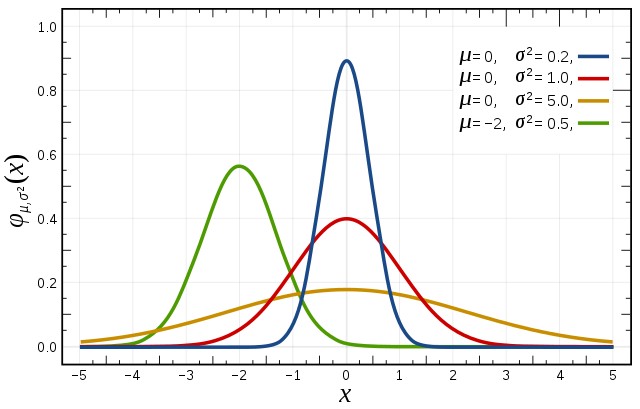
College-level statistics are more than needed for data science and business analytics, especially if you have taken an advanced statistics class or graduate-level statistics class.
However, if you never learn statistics with programming languages such as Python or R, online courses on this topic are beneficial or even necessary.
Based on my experience, you should complete as many exercises or problem sets as possible, as they will help you understand the concepts faster.
For those who are interested in Udemy courses, the learning platform frequently offers a sharp discount to all courses, so please make sure you grab every course you want during that time.
On the other hand, every Coursera specialization lets you try the full experience 7 days for free. Make sure you take this opportunity to try before subscribing.
Finally, this post contains affiliate links. I will receive a small commission from the online learning platforms if you purchase online courses through my links. I promise I will use this income to provide better content for visitors further.
Best Online Statistics Course (No-code)
These are introductory statistics courses that do not require learners to have a background coding knowledge. You will learn statistics and probability from the very beginning.
Those who want to learn data science but know nothing about statistics could benefit from these courses because a typical statistics for data science course will explain much less fundamental statistics concepts.
However, if you already know statistics and want to learn statistics for data science, you can skip this part.
1. Basic Statistics / Inferential Statistics (Coursera)
These two courses on Coursera are part of the Methods and Statistics in Social Sciences Specialization from the University of Amsterdam. You will learn basic concepts of statistics without any coding.
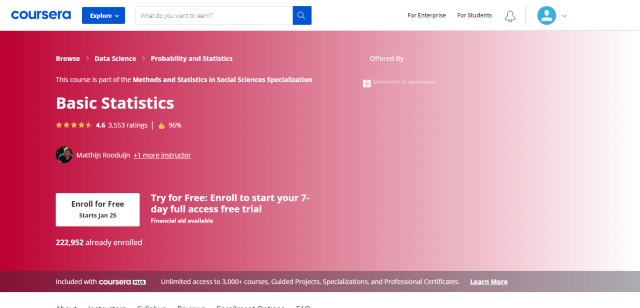
Course Content
Basic Statistics will cover these topics in basic statistics and probability.
- Data Exploration (mean, median, mode, standard deviation, variance)
- Correlation and Regression (bivariate analysis, OLS regression, R-squared)
- Probability theory (Randomness, Set theory, tree diagrams)
- Probability distributions (Random variable, normal distribution, binomial distribution)
- Sampling distribution and central limit theorem
- Confidence intervals
- Significant testing
Inferential Statistics is a continuation of the first course. You will learn how to make inferences based on relations. These statistical methods are crucial for learning machine learning, data analysis, and many more data-related fields.
- Hypothesis testing
- Categorical Association (Chi-squared test)
- Simple regression and multiple regression models
- Analysis of variance
- Non-parametric tests
You have to enroll in specialization to take these two courses. The subscription will cost $39 per month. After enrollment, you will be able to take every full course in the specialization.
Comments and Tips
These two courses are, in essence, the Statistics 101 course in college. You will learn all of the fundamentals of statistics and probability.
The great thing is in each course is the fact that there will be a final exam that tests the knowledge that you have learned so that your experience would not be different from that of college students.
However, some reviewers noted that the courses are fast-paced. Those who are not good at Maths may need to rewind frequently to understand all core concepts.
Approximate time to complete: 27 Hours and 23 Hours, respectively
2. Become a Probability & Statistics Master (Udemy)
This course is a reliable, concise alternative to the first course. The creator is Krista King, an experienced and popular math tutor on Udemy.
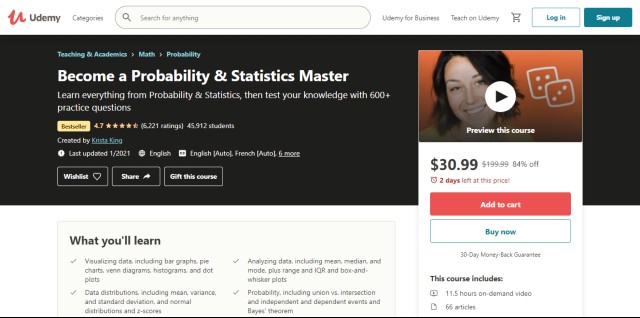
Course Content
- Basic data visualization (tables, graphs, charts, histograms, diagrams, etc.)
- Fundamental data analysis (mean, median, mode, spread, box-and-whisker plots)
- Distributions
- Probability theory and random variables
- Sampling and hypothesis testing
- Regression models
Each lesson is equipped with class notes and assignments to help you practice. Furthermore, Krista will also provide a workbook for those who want to solidify their knowledge from the course.
Comments and Tips
According to the free video tutorial, you will learn from the online blackboard doodle videos.
Krista will write down concepts on a Doodle blackboard and provide more examples and questions to help you understand intuitively. I also think this teaching style is more enjoyable than traditional college classes.
Krista also explains everything in a clear and friendly voice without a monotone. You will stay focused way more than taking classes with an ordinary professor in college.
In general, if you want to learn basic probability and statistics without a stressful college-like environment, this course is for you.
Course Length: 11.5 Hours of video lectures
Ratings: 4.7/5.0 stars
Students: 45,900+
3. Workshop in Probability and Statistics (Udemy)
For those who want a more detailed course, this workshop by George Ingersoll, an associate Dean at UCLA, is a compelling option to consider.
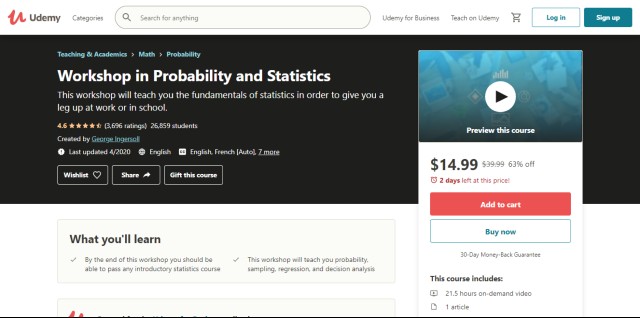
Course Content
- Basic probability and statistical concepts (Central tendency, Expected value, Standard Deviation)
- Conditional Probability, Bayes’ Theorem, Random variables
- Probability distribution
- Sampling and hypothesis testing
- Linear/Multiple regression
- Decision analysis
This course is full of quizzes and problem sets. Every lesson will have several of them for you to practice. At the end of the course, you will have a comprehensive assessment with detailed solutions to strengthen your skills.
Comments and Tips
According to the free video tutorial, George’s class will be similar to the college’s statistics class, but with a bit of an informal environment.
When he teaches, he gives out a lot of detail and provides thoughtful questions for students to think about. This approach will help you understand the concepts intuitively in a short time.
The greatest thing in this course is the course material, which has numerous real-world problem sets. Many reviewers noted that they are challenging and helpful in learning statistics.
Course Length: 21.5 Hours of video lectures
Ratings: 4.6/5.0 Stars
Students: 26,800+
Best Statistics for Data Science Courses (Coding)
Next, I will discuss the best statistics for data science courses.
Unlike the above courses, you will learn applied statistics for data-related fields. Course content is going to be different, and it certainly requires coding.
To take these courses, you should prepare yourself to code in Python or R. Background knowledge of one of these programming languages is beneficial or even necessary. Still, you don’t need to be a computer science expert to start learning.
4. Statistics with Python Specialization (Coursera)
This specialization from the University of Michigan will teach you to use Python for statistical inference, visualization, and modeling. You will learn with experts with many years of teaching experience at the university.
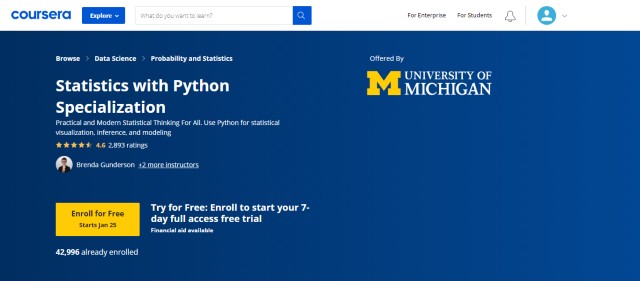
Course Content
There are three minor courses in this specialization, which you should take in order.
- Understanding and Visualizing Data– You will learn the basic concepts of statistics such as data exploration, data collection, interpretation, and many more. In lab-based sessions, you will learn to use many Python libraries such as NumPy, Pandas, Matplotlib, Seaborn, and many more.
- Inferential Statistics – You will learn to conduct data analysis, build confidence intervals, and use other statistical techniques for different datasets from various case studies.
- Fitting Statistical Models to Data with Python – You will learn to make inferences from relationships between variables and generate predictions for future observations. You will learn extensively about statistical modelings such as Linear/Logistic regression and many more.
The University of Michigan recommends spending 4 hours a week on the course to complete it in 3 months.
Monthly payment: $49
Comments and Tips
This specialization is probably one of the best statistics with Python courses. It will help you build a solid foundation for learning machine learning, deep learning and data science in general, as every library in the classes are tools that data scientists use in real life.
There will also be lab-based sessions where you will get hands-on experience. The course also provides numerous real-world case studies and datasets to help you conduct statistical analysis. This approach makes the program much more fascinating.
Though the instructors note that you don’t need a background in Python, I suggest otherwise. In this course, you will use many advanced Python libraries that may be difficult to understand for absolute beginners. Hence, taking the Python course beforehand will help you a lot.
5. Statistics with R Specialization (Coursera)
This specialization by Duke University is quite similar to UMich’s. However, you will use the R Programming language instead of Python. Once you complete the course, you can create a data analytics report on your own.
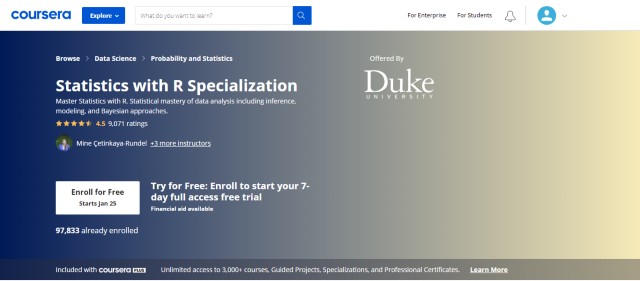
Course Content
There are five courses in this specialization. Again, it would be best if you took them in order.
- Introduction to Probability and Data: Basic probability theory, sampling methods, and data analysis techniques with R.
- Inferential Statistics – You will use R programming to perform hypothesis tests and interpret various data examples.
- Linear Regression and Modeling – You will learn linear regression and statistical modeling through theory and data examples. You will use R to fit, examine and utilize models to find the relationship between variables.
- Bayesian Statistics – This course will teach you to apply Bayesian’s methods to several real-world problems by using R.
- Capstone – You will utilize all knowledge learned from the previous four courses to complete a project. You will use R to conduct research and find specific answers to real-world questions.
Duke suggests you spend 3 hours per week learning. At this pace, you will finish the specialization in 7 months.
Comments and Tips
In general, this specialization offers one of the best statistics with R training online. You will learn step-by-step from the beginning to an intermediate level so that you can create a report of your own.
Again, the course provider does not note that you need background knowledge in R programming. However, many learners contradicted this by pointing out how they completely got lost in the latter part of the course because they could not perform R-related tasks.
Hence, I still recommend taking an R programming course beforehand.
6. Data Science: Statistics and Machine Learning Specialization (Coursera)
Unlike those five courses above, this specialization is an advanced course by Johns Hopkins University to teach statistics needed for data science and machine learning.
Those who are thinking of enrolling in this specialization need to understand R and basic statistics.
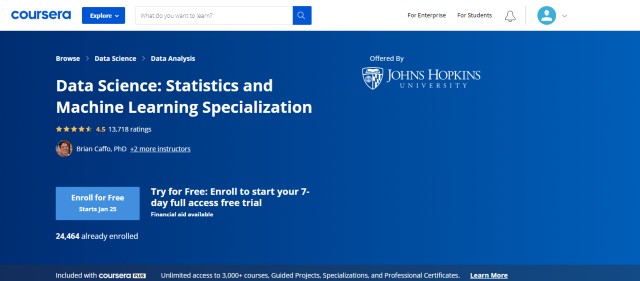
Course Content
You will complete the entire specialization by finishing all five online courses.
- Statistical Inference – You will start the journey by learning the theories and complexities of statistical inference to make better choices when analyzing data.
- Regression Models – A deep drive on regression models, one of the most vital data scientists tools. You will learn how to select the right models for your data.
- Practical Machine Learning – In this course, you will get started on machine learning. You will learn about training and test sets, overfitting, machine learning algorithms, and other prediction functions.
- Developing Data Products – You will learn to create data products using R Packages, Shiny, and interactive graphics. You will understand how to tell your data story to an audience as well.
- Capstone Project – You will create a data product from scratch by utilizing everything learned from previous courses.
Johns Hopkins University recommends spending 6 hours a week for six months to complete the specialization. A monthly subscription would cost $49 per month.
Comments and Tips
This specialization is a step upward from Duke’s course. Within one course, the instructors teach more advanced knowledge of statistics with R and introduce students to a world of machine learning.
Thus, you will need to finish other beginner courses beforehand. In other words, those who learn statistics for data science might want to take this specialization as the third course.
Still, I think this specialization covers an excessive variety of topics. You should not expect your instructors to drill deep, especially on machine learning. However, you will understand the basics that you can build upon further.
Also, you should beware of this specialization’s workload. Six hours a week is quite intense for everyone with a full-time job. You should make sure you have sufficient time to learn. Otherwise, you will waste your money to no avail.
7. MicroMasters® Program in Statistics and Data Science (edX)
The 7th course is a comprehensive Statistics and Data Science program offered online by MIT on edX. No introductory statistical concepts are needed to learn before, as your instructors will teach from the beginning to build your solid foundational knowledge of data science.
However, this does not mean this course has no prerequisites. You must excel in college-level calculus, Python, or even linear algebra to start learning.
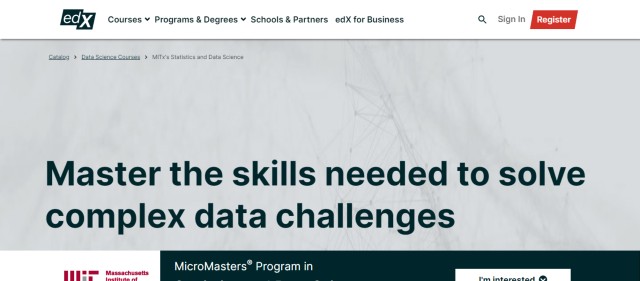
Course Content
The program has five available courses for you to take:
Core Courses:
- Probability – The Science of Uncertainty and Data – You will learn about probabilistic models, random processes, and statistical inference.
- Fundamental of Statistics – You will learn core concepts such as estimation, hypothesis testing, and prediction
- Machine Learning with Python: from Linear Models to Deep Learning – This course will teach machine learning from linear regression, the simplest model, to the advanced deep reinforcement model.
- Capstone – an exam to test your knowledge from previous courses
Elective Courses (Choose one to complete the program)
- Data Analysis: Statistical Modeling and Computation in Applications – You will learn to perform data analysis on real data from various fields, including genetics, economics, and ecology.
- Data Analysis in Social Science-Assessing Your Knowledge – You will use your data science skills to solve various cultural, social, and economic problems.
The program will take around 14 months to complete, while MIT expects you to spend 10-14 hours per week learning.
Similar to other edX courses, you will be able to audit the online courses for free. However, you need to pay $1,350 to buy the course for your assignments and projects will be graded by the team of the best data science experts from MIT.
Also, if you pass the final exam, you will get a professional certificate from the university.
Comments and Tips
This program is of grand scale. It comprises five graduate courses and perfectly blends a statistics, machine learning, and data science course into one program. The content in the classes is so comprehensive that you may no longer need to take an extra course on these topics.
However, spending 10-14 hours a week learning is burdensome for most adult learners with a full-time job. Also, this program is instructor-led, which means each assignment and test has specific due dates. You have to complete them on time.
In general, this is more like an online master’s program.
Therefore, before choosing to get a full program experience, you should make sure you have plenty of time to spend. Otherwise, auditing the course is a good idea.
Extra Statistics for Data Science Courses and Tips
If you still can’t find a statistics course that fits your learning style, or you want shorter ones, you might consider these courses. Most of them are crash courses on statistics and data science from Udemy. However, there are edX courses as well.
- Statistics for Business Analytics and Data Science A-Z™ – An excellent course for beginners, taught by an experienced data scientist, Kirill Eremenko
- Statistics for Data Science and Business Analysis – This statistics course was created by 365 careers. You will learn inferential and descriptive statistics along with other essential concepts used in data science.
- Professional Certificate in Data Analysis for Life Sciences – Offered by Harvard on edX, this program will teach you statistics, R programming, and data science for life sciences. If you work in this field, this program is your definite top choice.
Tips on Coursera specializations:
If you are interested in more than one specialization on Coursera, it is much better to become a Coursera plus member.
After paying $399 a year, you will gain full access to all 3,000 courses and specializations on Coursera for free. Hundreds of them are programming and data science courses that you can learn simultaneously without paying more course fees.
[sc name=”coursera” ][/sc]